
archives for 07/2016
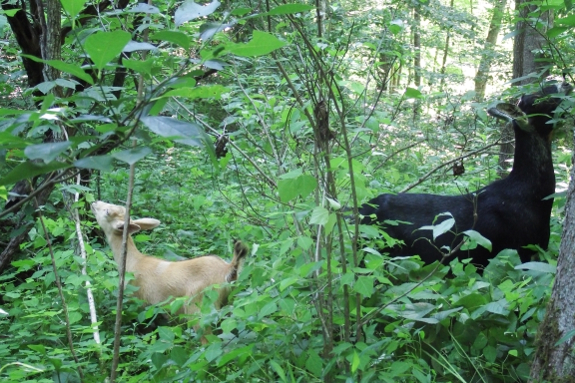
Oh the drama of farm
life! Mark
downplayed Aurora's illness when he posted about her earlier this week.
Personally? I was convinced she'd be dead every time I trotted up to
the goat barn to check on our baby goat.
Whatever it was came on
overnight. When we put her in the kennel at evening milking, our
doeling was spunky and happy. When I came to get her out twelve hours
later, she was standing against the back wall, listless. Her head was
cocked at an awkward angle and her whole body looked sore. She wasn't
interested in eating and wouldn't even nurse from her mother. Bad news.
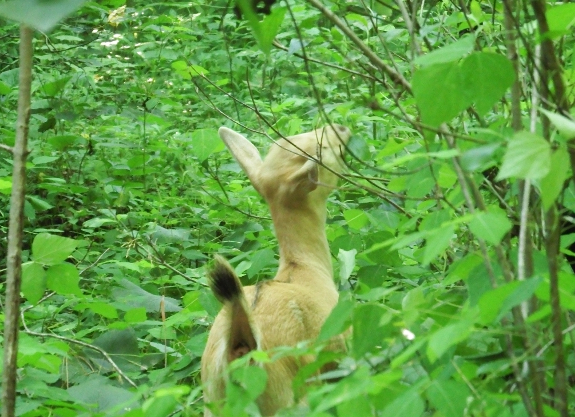
The vet guessed it might
be a heavy parasite load, mostly based on Aurora's age and the fact
she's a goat. To be on the safe side, he shot her up with selenium +
vitamin E, vitamin B-12, a painkiller/anti-inflammatory, and a
dewormer. Then he sent her home and told us to feed her half a cup of
yogurt per day until she started eating on her own.
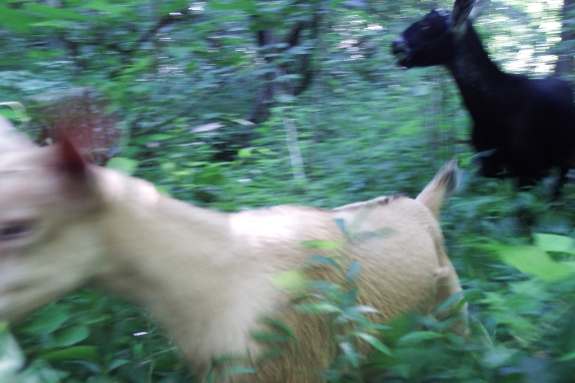
That turned out to be
quite a challenge. In fact, that first day I was so terrified that I
couldn't figure out how to get her to eat anything. But after a good
night's sleep I remembered the big, needle-less syringes I'd bought as
part of our kidding kit. Yogurt mixed with some goat milk and a bit of Nutri-drench was just thin enough to
squirt down her throat if Mark restrained her and I pried open her
jaws. By the dinner feeding, Aurora was starting to look a little less
pained and a little more normal.
But 48 hours after her
symptoms appeared, she was still in very bad shape. Proving that our
goats are pets rather than livestock, we
rushed Aurora back to the clinic at the vet's earliest possible
convenience. This time, our doeling got an anti-coccidiosis shot, two
types of injectable antibiotics, a different dewormer, more vitamin
B-12, and a corticosteroid. The vet also sent us home with followup
shots for the antibiotics and a big jug of amino
acids/electrolytes/vitamins.
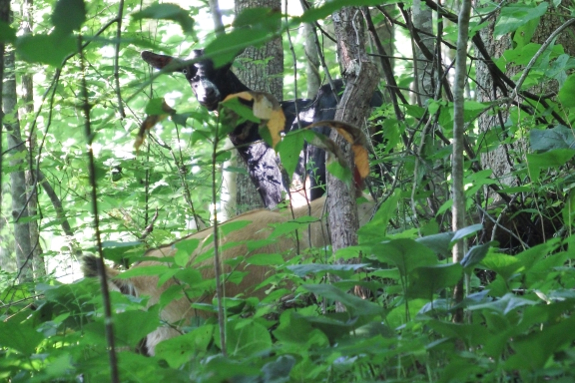
If you've seen me in
real life avoiding doctors at all costs (except for my sweet
sister...who I see in a nonprofessional capacity), you'll know I'm
leery of unnecessary pharmaceuticals. But I was terrified of losing our
dear doeling and was thrilled to have the vet inject Aurora with
everything under the sun.
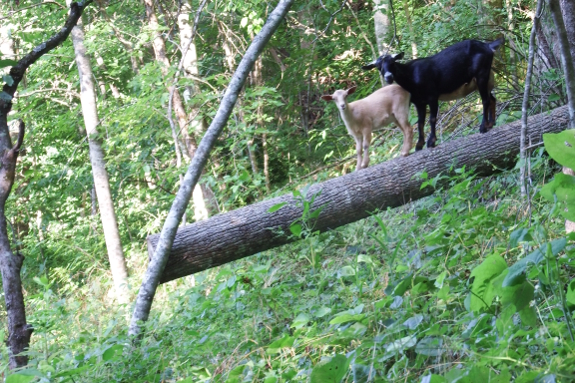
To my delight, something
worked. We hadn't been able to get Aurora to eat on her own or nurse
for two full days, but on the way home she was already nibbling on
Mark's sleeve. Six hours later, she was ready to go out and graze with
her mother and bounce about on logs. The next day, we stopped squirting
yogurt down her throat because Artemesia's udders proved that the
doeling had drunk a pint of milk overnight.
I'd feel better if I
knew for sure what had been wrong with Aurora. I think it's quite
possible she was weakened by her brother's weaning --- Punkin is much
more adamant than his sister, and I think she actually got more milk with him present
because he was better able to pin their mother down better. (Artemesia
is starting to think her kids are big enough to eat greenery and not
visit the milk bar all the
darn time.)
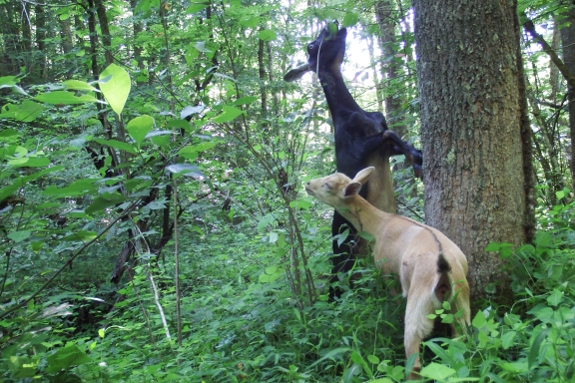
Or the vet may be right
and it's my own fault for not forcing Aurora to eat her copper
bolus when the rest of the herd was treated last week. I hadn't
thought she was at as much risk of worms due to subsisting so much
milk. But it's easy to see how intestinal parasites can explode when
gut bacteria are just starting to figure out the transition from milk
to grass and when kids haven't yet learned not to eat off the ground.
Aurora will definitely get her copper next week once her system is back
up to snuff.
I'd be curious to hear
from other goatkeepers. Based on the data above (and especially the
speedy bounce-back time), any ideas what was wrong with our little
goat? And, for everyone else (especially Kayla and Jed), thank you so
much for sending your healing wishes in Aurora's direction. It's
wonderful to have you on our team.
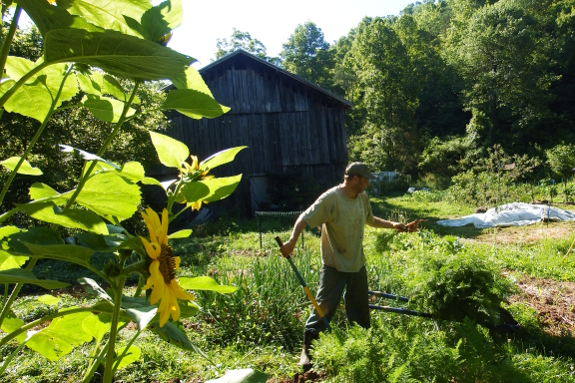
Total yield: approximately forty pounds.
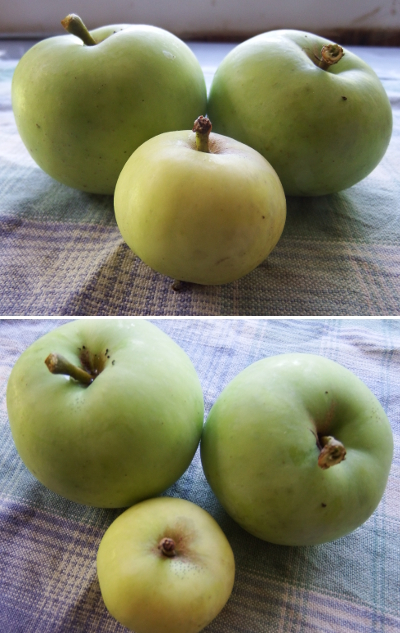 It
occurred me to me as elf-sized Early Transparent apples kept dropping
from the tree and I kept happily gnawing them up that perhaps those
weren't June
drops after all. Perhaps they were merely apples ripening early and
small.
It
occurred me to me as elf-sized Early Transparent apples kept dropping
from the tree and I kept happily gnawing them up that perhaps those
weren't June
drops after all. Perhaps they were merely apples ripening early and
small.
For the sake of
comparison, I'm showing two apples of the same variety from our
less-high-density dwarf tree beside one of the "June drops." The
former are bigger and greener, making it more obvious that the elfin
apple is actually almost a little over-ripe. (The mealy texture of
the last few picked off the ground proved the same point.)
So my new conclusion is
that I didn't thin the flowers on that high-density Early Transparent
enough. It probably could have used some manure too, but the
neighboring high-density Red Empire is bulking up its (fewer) fruits
much more gamely, pointing to a variety-specific thinning problem.
Next year, I'll thin
harder. But this year, I'm enjoying eating my mistakes.
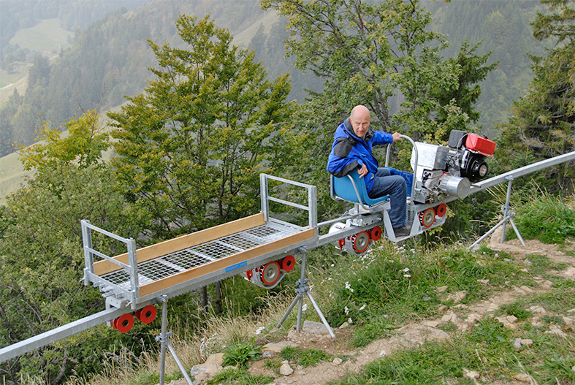
We finally figured out a price structure for a farm monorail system.
The cost of 920 feet of track
which includes the support structures with a tractor car and one pallet
car was going to be 60,000 before shipping.
It's way out of our price range so we are going back to the drawing board for some new ideas.
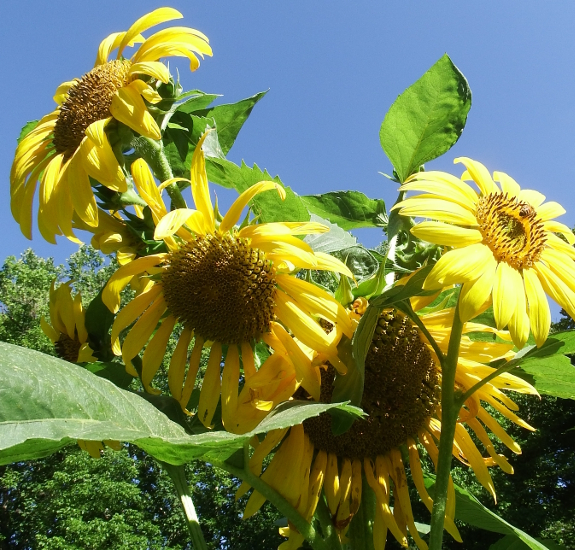
There's nothing like
big, yellow sunflower heads to prove that it's truly summer. Corn is
tassling, the first slicer tomato will soon be ripening, and okra
flowers are budding. We're eating green beans, summer squash, tommy-toe
tomatoes, Swiss chard, and the last of the lettuce while waiting on the
harvest deluge to hit.
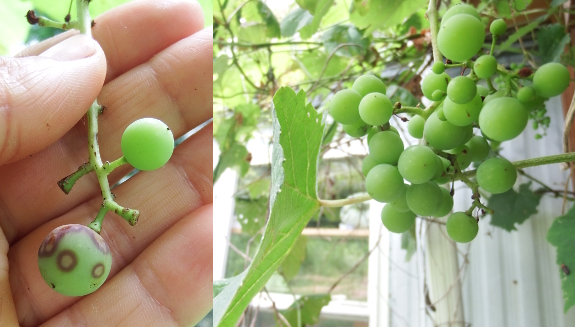
We're currently growing three
varieties of seedless grapes.
Himrod isn't quite old enough
to fruit. Mars Seedless sets fruits heavily...then loses them to
blights.
So far, Reliance appears to
live up to its name. We'll report back again in a couple of months when
the fruits ripen up.
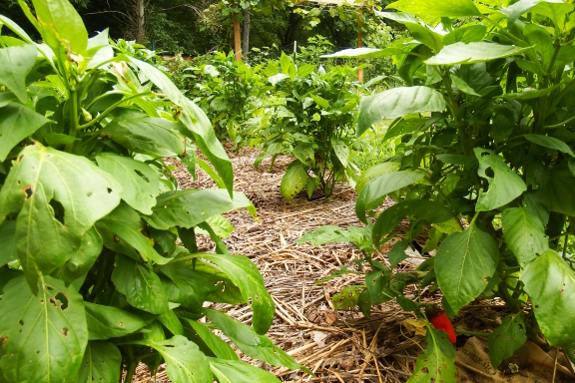
Lack of nitrogen is
generally the early warning sign. Since I've been trying to use only
on-farm compost and manure this spring, I ended up with a few
low-nitrogen spots that required topdressing.
I wish I'd taken a
picture of the peppers above before their dosing so you could see the
difference a thin layer of chicken-manure bedding between the rows
created. The leaves were slightly yellow at that time, but mostly the
plants just weren't growing the way they ought.
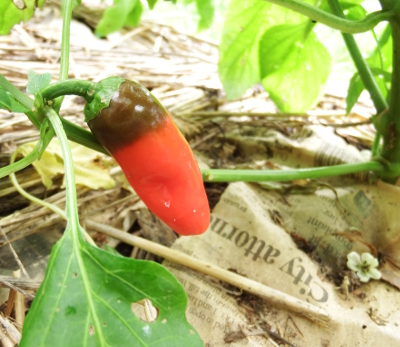 I wasn't really surprised by
the problem because I'd treated the bed to the last of our garden
compost pile, which is much lower in nitrogen than composted manure.
Then I'd laid down a weed-control layer of newspaper (high carbon) and
weighed that down with a thin layer of homegrown rye tops (also high
carbon).
I wasn't really surprised by
the problem because I'd treated the bed to the last of our garden
compost pile, which is much lower in nitrogen than composted manure.
Then I'd laid down a weed-control layer of newspaper (high carbon) and
weighed that down with a thin layer of homegrown rye tops (also high
carbon).
Luckily, garden plants
are resilient beings. A week after getting their extra nitrogen dose,
the plants greened up and started growing. A week after that, we had
our first ripe lunchbox pepper.
Definitely worth feeding
the soil a little more so the soil will then feed us!

Thank you Roland for the driveway
number crunching.
One of the outside the box
alternatives to a monorail is a 6 wheeler.
The basic model is around 10k.
Not sure if it would do too
much damage. More research is needed.
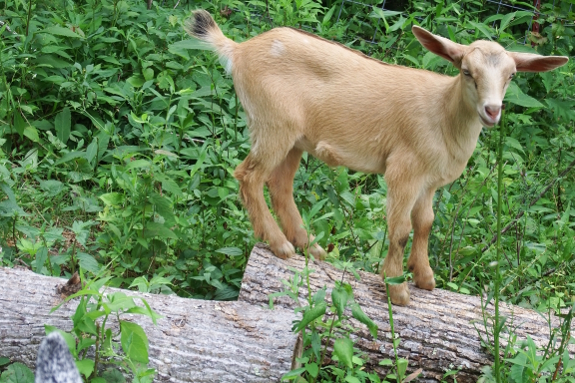
The only residual ill
effects from last
week's goat scare appears to be some newfound skittishness on our
doeling's part. Not that I blame her. After all, if someone pushed a
syringe down your throat six or seven times whenever they picked you
up, jabbing you in the shoulder now and then for good measure, you'd
probably be a bit gunshy too.
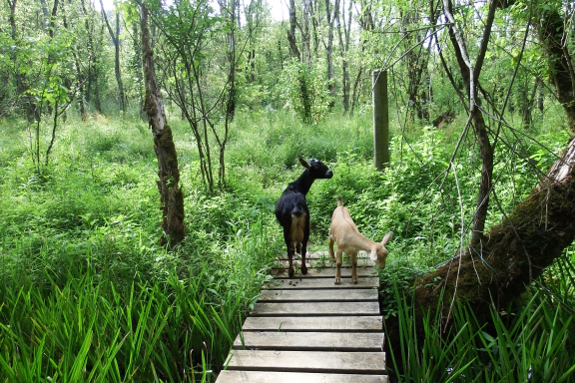
Actually, Aurora is just
fine as long as I'm walking or sitting down. But if I stand too close
to her, she has a tendency to run away.
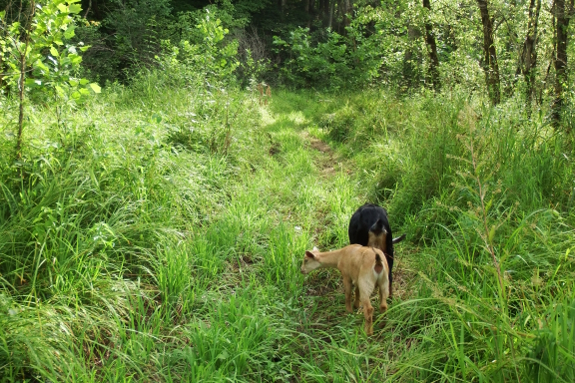
Which wouldn't be a
problem if Artemesia and I hadn't developed a fondness for grazing on
the other side of the creek. (Okay, she grazes while I soak in the deep
hole, letting the minnows nibble on my feet.)
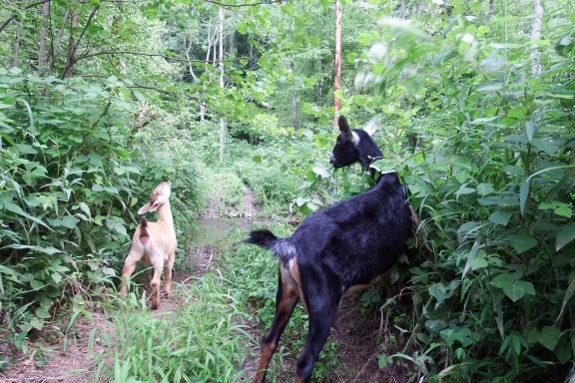
The trouble is, our doe
has learned how to cross on the stepping stones, but our doeling has
not. Back before Aurora got sick and Punkin got put in weaning time
out, I'd just grab a kid under each arm and carry them across. But
nowadays I have to sit beside the water and pretend to be reading to
tempt our doeling to come close enough to be grabbed.
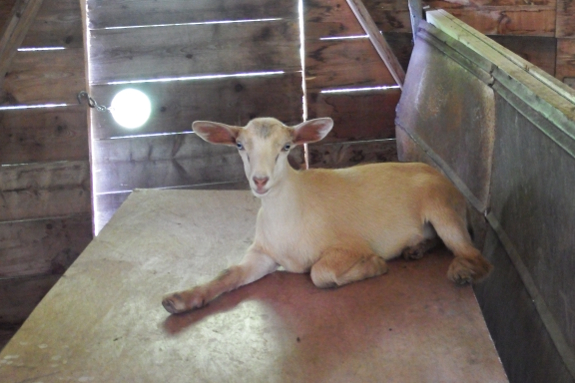
To my relief, while I
soaked in the creek and pondered the problem Monday, Aurora figured out
the stepping stones. "Now you have no reason to pick me up!" our little
princess proclaimed. "Let us all eat grass!"
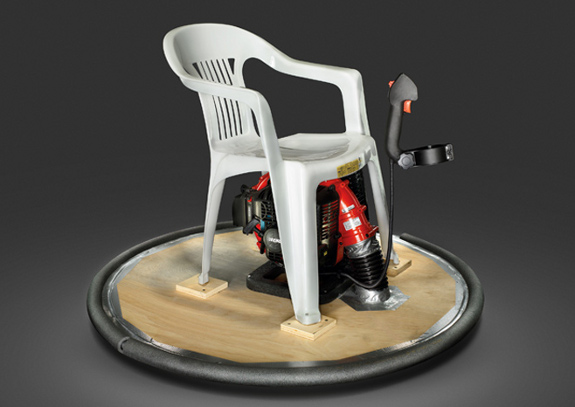
This DIY hovercraft
was made by one of the Myth Buster guys back in 2012.
He made it for his kid, but I
was thinking if it would hold a kid it might hold some 5 gallon buckets
loaded with horse manure.
Maybe make it bigger with a
few more leaf blowers and it could be pulled like a wagon across the
swamp and back to the garden.
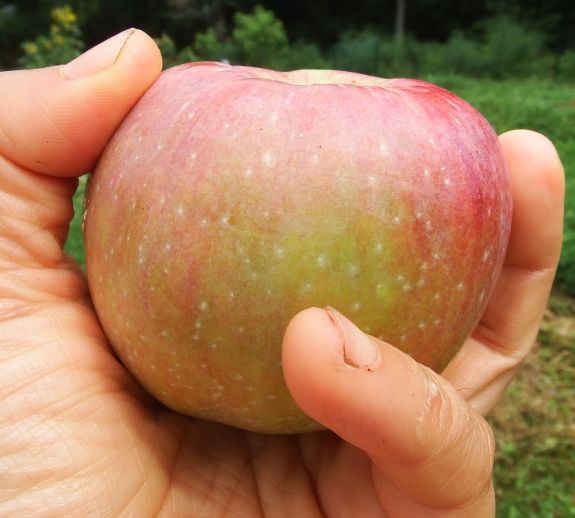
When I wrote that guidelines three years ago during our last apple-friendly season, I missed one very important point --- time of year. I picked the above King David apple this weekend in part
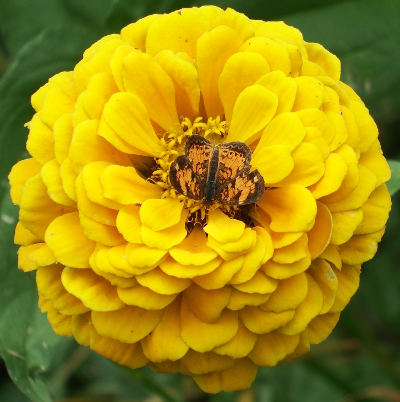 because the limb was bending
down to the ground under its weight, but also because this particular
fruit just looked ripe. Cutting the fruit open, though, I
discovered that the seeds were still white and the flesh was dense and
tart. (Which isn't to say I didn't eat it anyway!)
because the limb was bending
down to the ground under its weight, but also because this particular
fruit just looked ripe. Cutting the fruit open, though, I
discovered that the seeds were still white and the flesh was dense and
tart. (Which isn't to say I didn't eat it anyway!)I could have saved myself the imperfect apple, though, had I done a quick google search. Turns out King Davids are very late-season apples and aren't supposed to ripen until October. Oops. Hopefully I'll be able to hold off on plucking the other fruits until the fall.
We decided to give our over
Wintered brussels sprout
to Artemesia.
They just didn't look good
enough to cook.
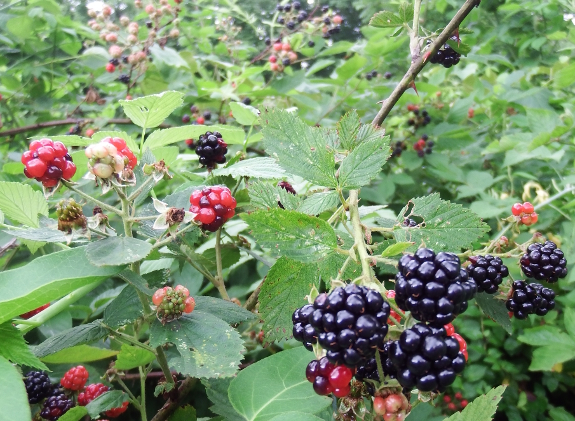
It's been an excellent
year for wild blackberries. I accidentally let a huge patch grow up in
the one part of our core homestead that we haven't managed to reclaim
(and which will probably be turned into goat pasture eventually). The
soil is quite fertile there, but it's bad for gardening because the
spot is simply too shady for most vegetables. Blackberries, though,
don't seem to mind.
While tromping through
the thorns picking dessert, I also stumbled across the same grape vine
I've been noticing then forgetting about for the last ten years. It was
growing on the west 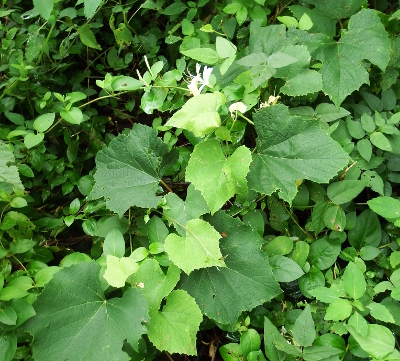 side of the old house and
soon disappeared into the weeds when the house came down.
side of the old house and
soon disappeared into the weeds when the house came down.
Based on the leaf shape, my gut feeling was that the grape was a
cultivated variety. But I wasn't positive until I found fruits nearly
an inch in diameter hidden amid the briars last week. Here's hoping I
can remember to hunt them back down in a month or so when they're
ripe...and maybe take a cutting since this variety definitely seems to
shrug off everything from blights to beetles to weeds while still
producing a crop.
(No picture of the
grapes themselves --- sorry! I didn't have the camera when I found them
and didn't want to wade back in there once I was suitably equipped. But
I think these leaves came from the same plant....maybe.)
The field
corn is mature enough to be thinned out this week.
Anna gives the deleted stalks
which have no corn to Artemesia.
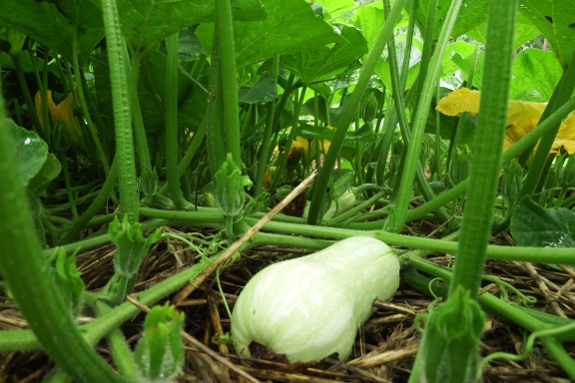
It's been such a hot
summer that a week of rainy mornings is a bit of a relief. It takes
more oomph to get myself to go outside in the drizzle, but then I end
up reveling in the gentle drip of rain on leaves.
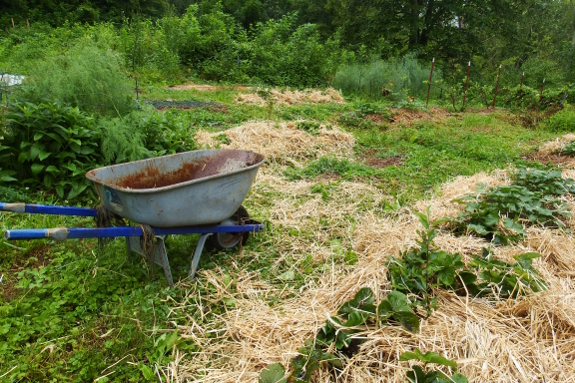
Those of you who till
have to be more careful of entering your garden in the wet. Even your
footsteps can compress soil that might be earmarked to grow next year's
corn. But with permanent aisles and no soil-movement in sight, a rainy
day is a perfect time for no-till
garden cleanup.
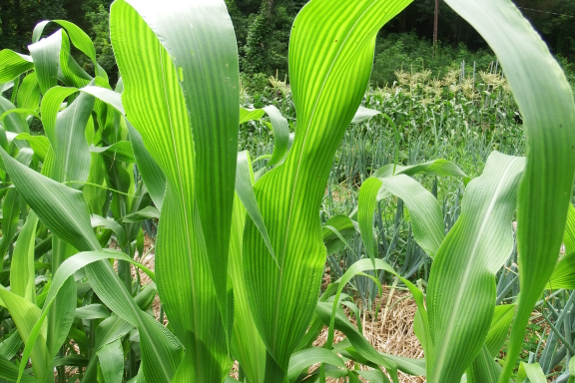
This week, I planted
fall carrots, renovated
some strawberry beds,
and weeded and topdressed about half of our asparagus. There's
something joyful about knowing I'm working on plants that will feed us
in 2017.
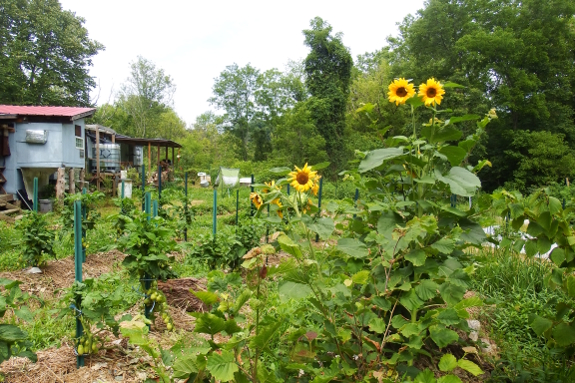
Meanwhile, Mark mowed
and weedate like crazy. Both his and my battles with the weeds are
still a draw, but I have a good feeling that we'll win in the end. And
on a rainy morning like this, we certainly have fun doing it!
Our local feed store has
agreed to sell a 5 gallon version of our EZ Miser.
It's the one in Copper Creek
between Castlewood and Abingdon.
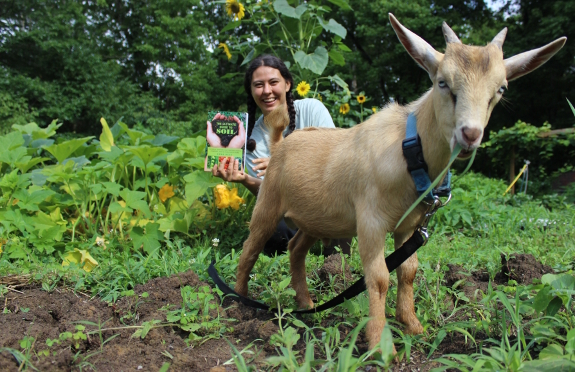
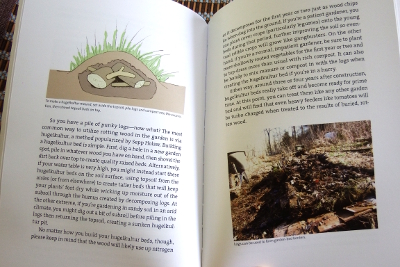 I'm
thrilled to announce that my newest paperback is now live
on Amazon!
I'm
thrilled to announce that my newest paperback is now live
on Amazon!
The Ultimate Guide to
Soil isn't technically slated to be published for another week or so.
But if you preordered, your copy should be in your hands soon.
My official author
copies are still in transit (so signed thank-you books for contributors
haven't gone out yet). But I splurged and bought a copy on Amazon to
show off (with Punkin's help, of course).
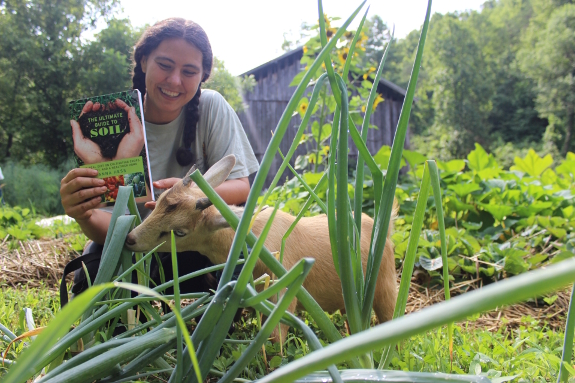
The Ultimate Guide to
Soil is a hefty book, full of all of the tidbits I've learned over the
last decade about improving and maintaining 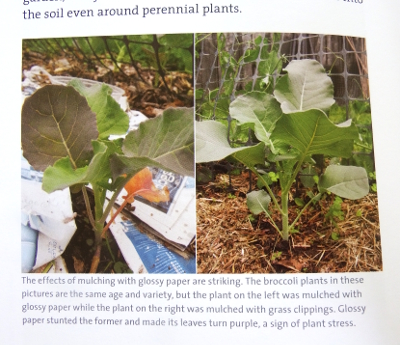 soil in a no-till garden.
There are sections on soil testing, no-till management, and
remineralization, plus an encyclopedic overview of organic soil
amendments including everything from manure and straw to bokashi bins,
black soldier fly compost, and humanure.
soil in a no-till garden.
There are sections on soil testing, no-till management, and
remineralization, plus an encyclopedic overview of organic soil
amendments including everything from manure and straw to bokashi bins,
black soldier fly compost, and humanure.
Basically, if we've
tried it, it's in this book. And you know I like to try everything.
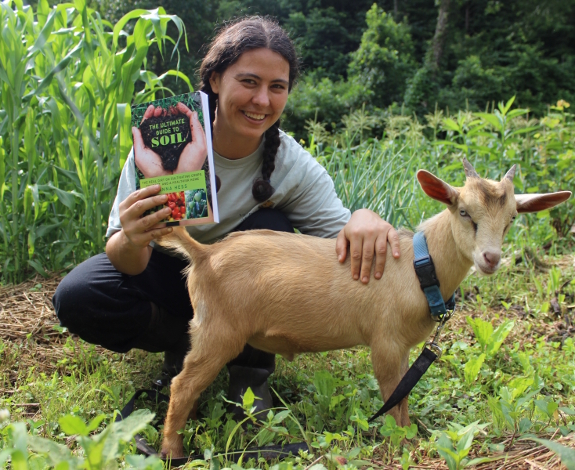
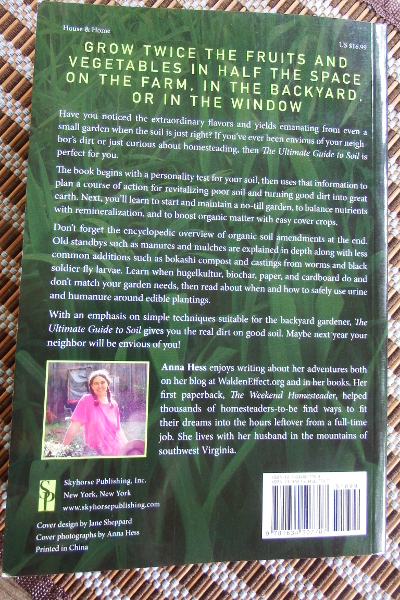 I
geared the book toward both beginners and advanced gardeners alike,
including highlights of my own garden's growing pains so you won't have
to repeat those mistakes. I also included my successes of course, along
with tips for turning problematic dirt into prime garden soil. Then I
rounded it all out with the experiences of other gardeners and a hefty
helping of library research.
I
geared the book toward both beginners and advanced gardeners alike,
including highlights of my own garden's growing pains so you won't have
to repeat those mistakes. I also included my successes of course, along
with tips for turning problematic dirt into prime garden soil. Then I
rounded it all out with the experiences of other gardeners and a hefty
helping of library research.
Interested? The
paperback is live on Amazon and Barnes
and Noble, and
should be hitting bookstores and libraries soon. (If you don't see it
locally, be sure to request that your favorite establishment get a copy
in stock.)
If you prefer ebook
format, please be aware that this is the same book I've been
publishing in quarters over the course of 2016, so don't feel you have to
buy it again. You can save a
few bucks by buying the bundled version on Amazon, though, and you can also
download a free ebook copy on Amazon when you order a copy of the print
book. The bundle will be available on other platforms in a week or so
as well once it's been reformatted for epub.
I hope you enjoy The
Ultimate Guide to Soil and will consider telling your friends, sharing
the link on social media, or perhaps writing a review. Thank you so
much for your support --- you are why I write.
This post is to remind me not to dig up thistle plants near the waterline power.
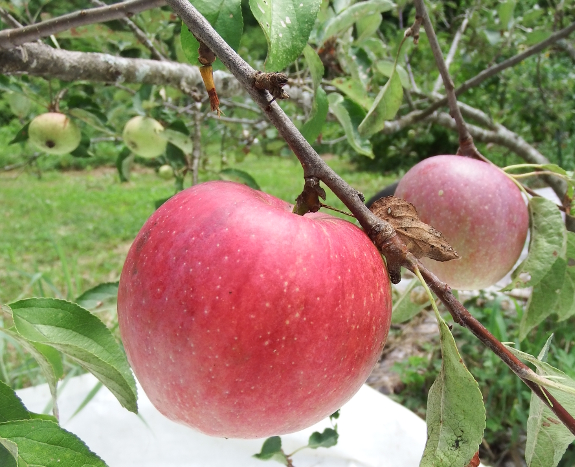
This post is a
compilation of tidbits from the garden week, none of which is big
enough to really turn into its own post. I hope the result isn't too
disjointed for you.
I'll start by saying
that we got to taste our first homegrown William's Pride apple on
Saturday. It was sweet and delicious! I'd
thought this grafted limb was King David, actually, but the strange
ripening date prompted me to look back at my notes and figure out that
my memory was way off. Good to know since I think we'll want to expand
the planting in the future.
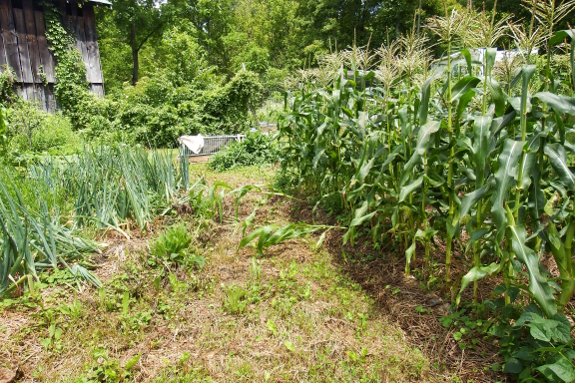
Second tidbit --- a
storm lodged some of our biggest corn. I was a little concerned about
having put off thinning
the field corn until
the plants were nearly as tall as me, and it turns out my gut reaction
was right. The photo above shows sweet corn thinned earlier that only
barely lodged, while almost half of the field corn blew down. The
lodged plants will likely survive, but I'll try to do a better job
thinning earlier in the plants' lives anyway.
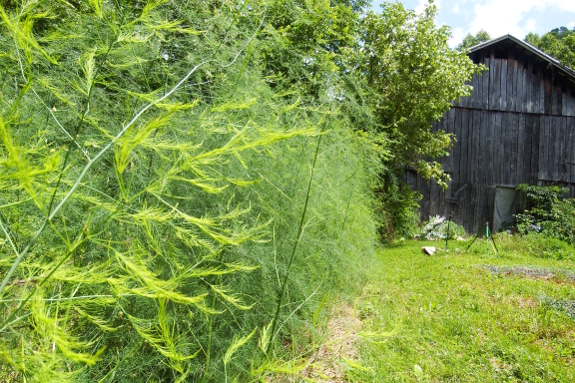
On a more positive note,
our asparagus is thriving now that the partially composted goat manure
topdressed in June has had time to soak into the ground. This is a big
relief since last year's uncomposted goat manure burned new asparagus
fronds and resulted in a smaller crop this spring. Looks like asparagus
2017 will be bountiful.
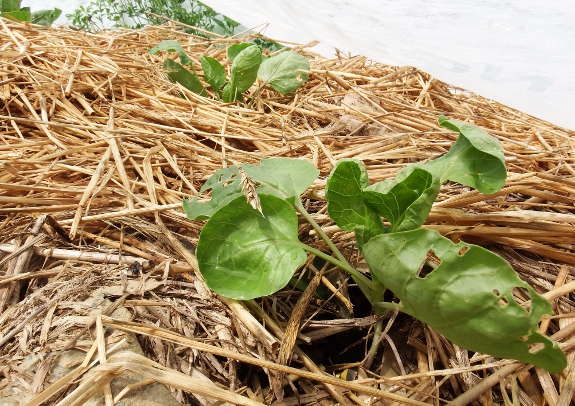
Under
the row covers,
brussels sprouts are growing well. It's always nice to have a
set-it-and-forget-it portion of the garden in the midst of the summer
flurry of activity. Without having to worry about cabbage worms, the
fall crucifers definitely fit the bill. I'll probably repeat the
endeavor with the broccoli seedlings that will be outgrowing their flat
soon.
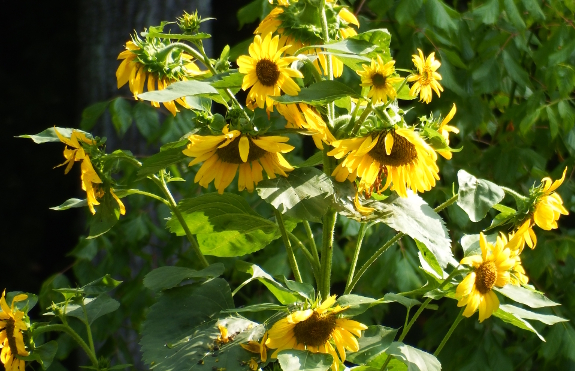
And that's all of the
news here. I hope your garden is thriving and beginning to feed you
bushels of produce!
We tested our first propane
weed burner today.
The Weed
Dragon is easy to set up and ignite.
Stay tuned for more detailed
updates in the near future.
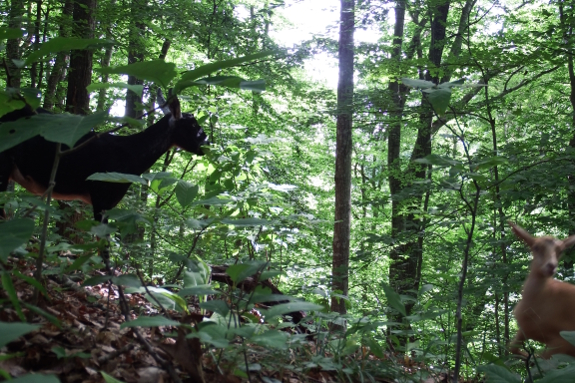
Some days, my biggest
conundrum is --- where shall the goats and I go for our free-range
adventure? The floodplain is usually a winner in the summer, but
several inches of rain means it's currently too soggy for caprine feet.
Garden edges fill bellies fast but mean I have to stay alert since
Aurora has recently lost her unleashed nibbling privileges.
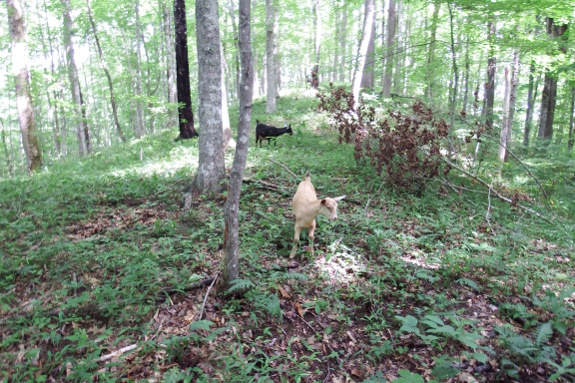
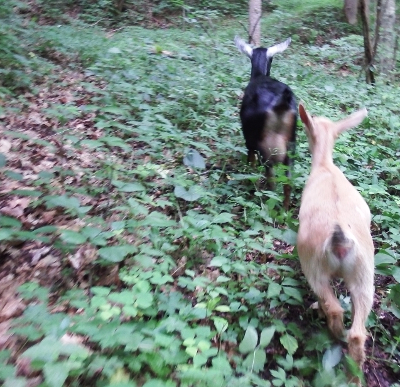 "How about up on the hill?" I
asked Artemesia.
"How about up on the hill?" I
asked Artemesia.
"Less food means more
time grazing," she countered.
"Okay," I agreed. And
off we went.
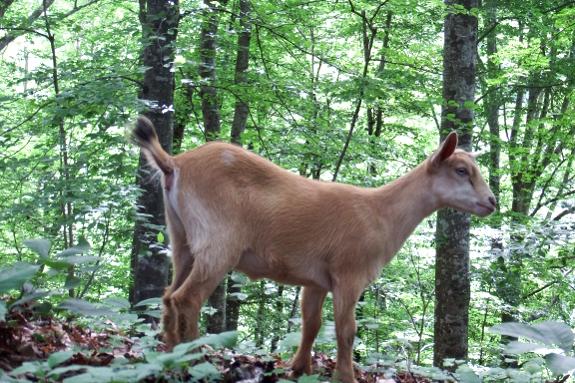
 Punkin
stays home in his weaning paddock, so we're back down to a herd of two
--- the perfect size for me. And our current girls are so sweet and
malleable I usually don't even have to ask them to follow.
Punkin
stays home in his weaning paddock, so we're back down to a herd of two
--- the perfect size for me. And our current girls are so sweet and
malleable I usually don't even have to ask them to follow.
Instead, I busy myself stroking ourly newly affectionate doeling and
brushing deer flies off Artemesia's forehead. A perfect morning to be
in the woods.
We harvested our potato
onions today.
The yield was very low.
This will be the last year we
plant them so we can make room for something more productive that won't
feel like a waste of a raised bed.
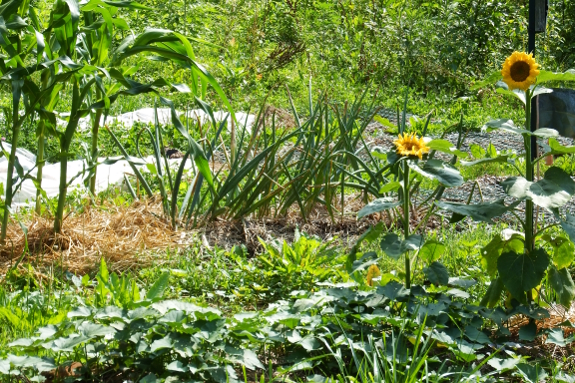
Some days, the summer
feels so fleeting.
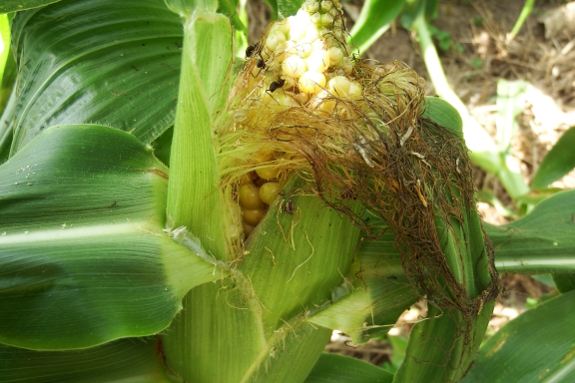
It's time to harvest the
first sweet corn...
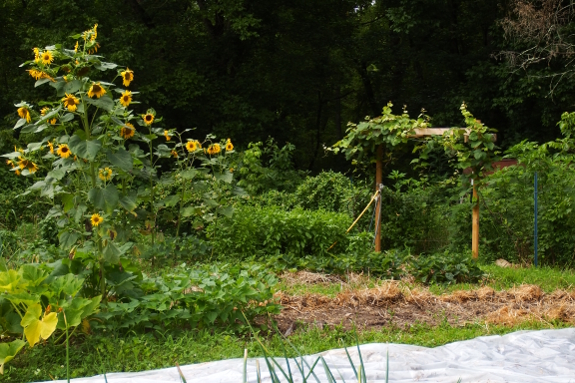
...and plant the last
sweet corn.
Five months from from
frost to frost seems like an eternity in May and a heart beat in
October. I'd better pause now and soak up the sun.
We've been eating Masai beans for about a week but today is the first big harvest where we'll blanche and freeze some for the Winter.
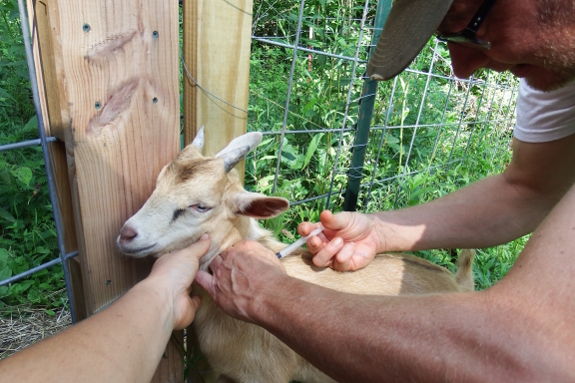
Punkin got his followup
CD&T injection this week, which means he's now ready to become the
stud at a nearby friend's farm. We're 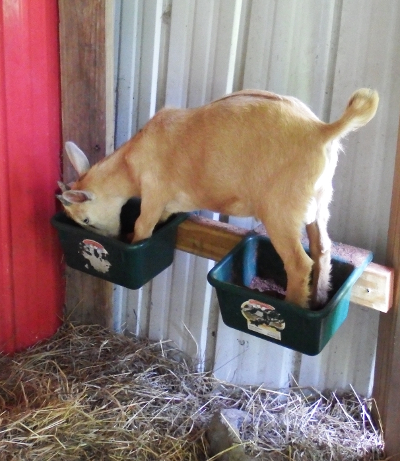 just
waiting on that friend to recover from eye surgery so he can take on
the handful that is our 11.5-week old buckling.
just
waiting on that friend to recover from eye surgery so he can take on
the handful that is our 11.5-week old buckling.
(No, Punkin, the mineral
feeders were not intended to be eaten out of in that manner.)
Punkin is the first goat
I've ever weaned, and after watching him I'd say that eight weeks old
probably is too young to go off milk for
most goats. Our buckling came out of his weaning at a perfect, svelte
3.0 on the body-condition
chart...but that's
only because he began with rolls of fat around his shoulders and
because I let him nurse at slowly lengthening intervals for the first
two weeks. A skinnier goat or the recipient of a cold-turkey weaning
would have had a much harder time making the transition to grass.
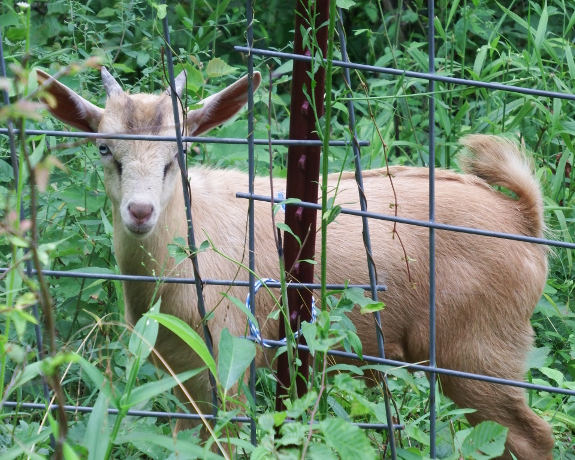
In the meantime, Punkin
has gotten used to being in a neighboring pasture rather than being a
true member of the herd, and he seems even more affectionate toward
humans as a result of his ostracism from goat-kind. In fact, he's the
most dog-like goat I've ever met. He definitely inherited all of
Artemesia's sweetness and added a level of charm all his own.
In other words ---
Punkin's new owner had better pick him up soon before Mark and I fall
any further in love!
We had a small storm last
week that blew some of the sweet corn over.
Yesterday was our first
dinner with fresh sweet
corn.
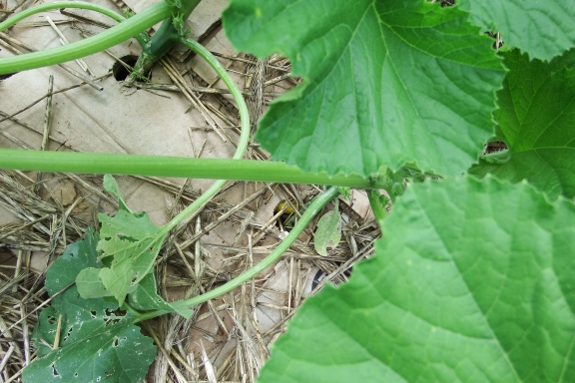
After years of kill
mulching, I've become a bit of a cardboard connoisseur. Corrugated
vastly trumps uncorrugated. Smaller flaps mean more ground coverage
than larger flaps. And produce boxes with holes in the middle? I used
to think those were a pain in the butt...until now.
It occurred to me as I
prepared to plant some summer squash in the site of last year's compost
pile that weeds were going to pop up like mad in the newly bared
ground. So I laid down a kill mulch first, using a holey box as my
central row. Then I poked a single squash seed into the soil beneath
each hole.
A month later, the
squash are thriving and I've finally decided I love those holey produce
boxes. What part of the waste stream will I find a perfect use for
next, I wonder?
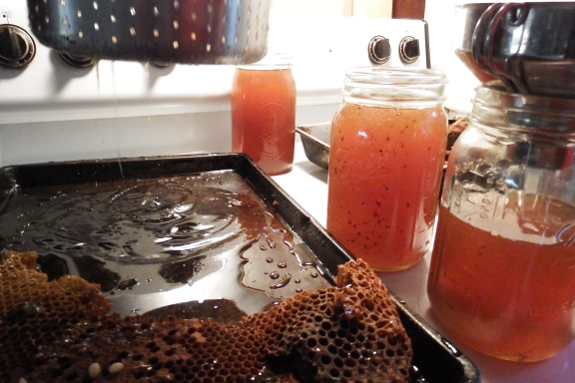
We had a major honey harvest
today.
The last
time we harvested this much honey was 6 years ago.
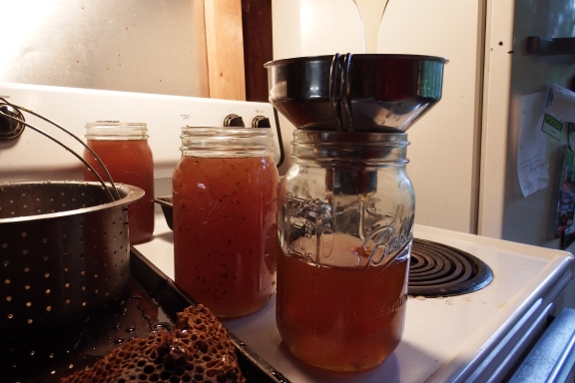
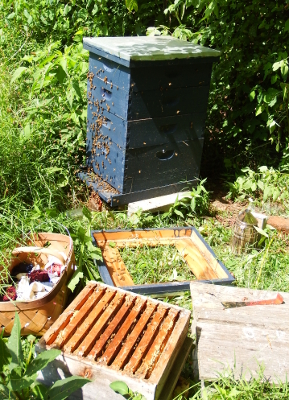 As Mark mentioned yesterday,
we finally harvested honey for the first time in six
years. The long-time
reader might assume that means my
conversion back to Langstroth hives while keeping my chemical-free
strain of bees going was just what the doctor ordered. And you
wouldn't necessarily be wrong...but you wouldn't necessarily be right
either.
As Mark mentioned yesterday,
we finally harvested honey for the first time in six
years. The long-time
reader might assume that means my
conversion back to Langstroth hives while keeping my chemical-free
strain of bees going was just what the doctor ordered. And you
wouldn't necessarily be wrong...but you wouldn't necessarily be right
either.
The jury's still out on
which hive system makes more honey because I harvested about the same
amount from both the primarily Langstroth hive and from the Warre hive.
In both cases, the honey overload is due to an excellent nectar season
that culminated in our basswood blooming fully for the first time in
nearly a decade. Lots
of nectar makes lots of honey, regardless of the type of hive.
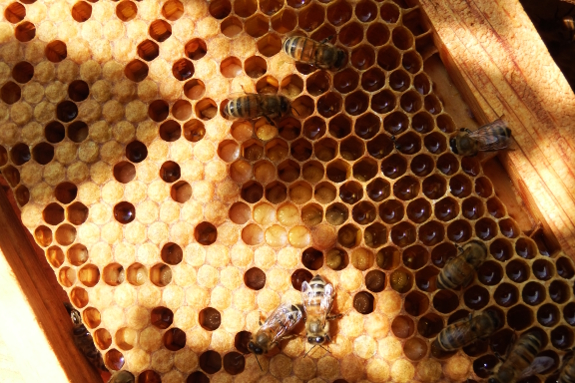
So how much honey did I
take? It's complicated. Initially, I planned to harvest the one
remaining Warre box on top of our converted hive since I'd found lots
of brood and eggs lower down on Langstroth frames and knew the queen
had vacated the attic. But once I got that box home and started pulling
out the frames, I discovered that there was still brood at the bottom.
So I harvested three full frames of honey and went to put the Warre box
back with its brood intact.
But I really wanted to
call that conversion complete, so I put the box back on the other hive
instead of the one I originally took it from. And while I was in there,
I discovered that the Warre hive had a very full box of capped honey as
well as at least two other quite heavy boxes. So I snagged the former
rather than towering their living quarters over my head.
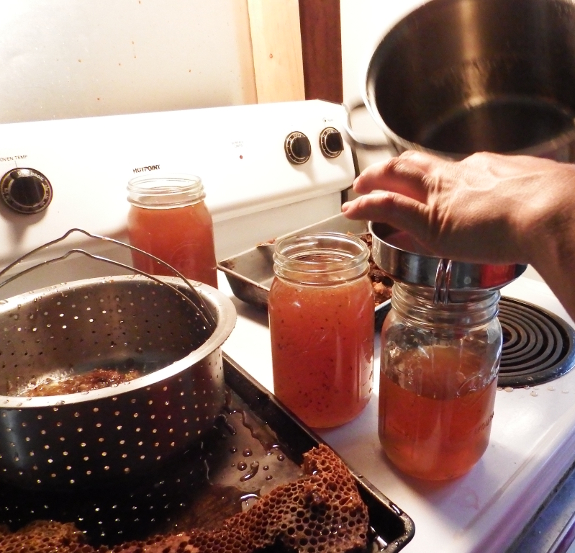
To cut a long story
short, I think I ended up harvesting about 1.3 Warre boxes in the end.
Rather than going high-tech, I simply squeezed each frame into a
strainer and ended up with about 2.5 gallons of honey. A very sweet
reward after years of trial and error!
Planting broccoli starts now should give us several weeks of broccoli in the Fall.
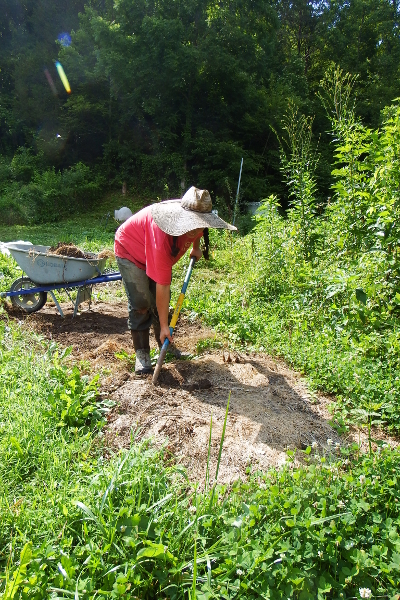 I'm just about done with my quest
to consolidate all of the best soil into the sunniest part of the
garden.
I'm just about done with my quest
to consolidate all of the best soil into the sunniest part of the
garden.
On the plus side, my
gardening workload has decreased because I get more produce from a
smaller space.
On the minus side, I
haven't had room to plant a single bed of buckwheat all summer. (Fall cover crops will still go in as
planned.)
Now the big question ---
what to do with the shady spaces left behind? Next time dry floodplains
and working four-wheelers align, I'm hoping to drag in another round of
livestock panels to build more goat pastures.
Because having Artemesia standing inches away from my sweet corn
watching me weed is a good idea...right?
The Plant-Scaper
trellis support we installed a few weeks ago is looking good on
these cucumber plants.
We could attach more segments
if we wanted to go higher.
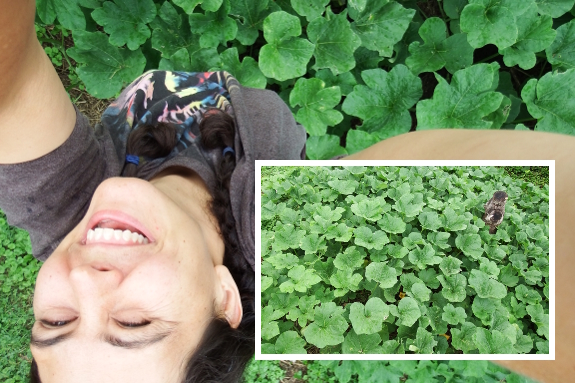
I went out to try to
take a photo of our butternut patch with a human in it for scale, but
ended up getting this odd selfie instead. So I've inset another photo
of most of the patch to give you an idea of the impressive coverage of
those squash vines just a couple of months after planting.
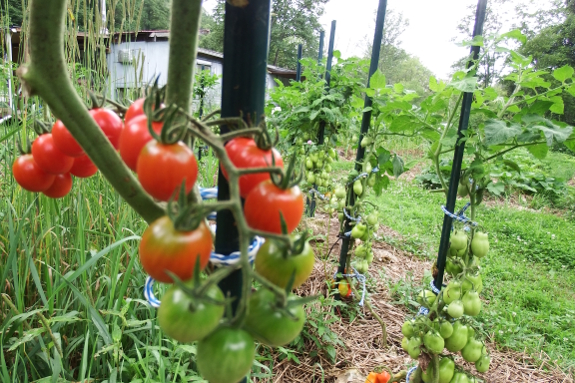
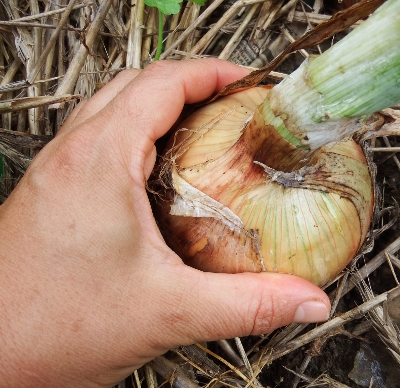 Elsewhere
in the garden, it's starting to turn into preserving season. We're
putting away our usual soups as well as lots of frozen green beans and
okra since the latter turned out to be a crowd pleasure this winter. It
looks like we'll be harvesting our onions this week too. It's
definitely time to make like ants if we want to eat well during the
cold season ahead!
Elsewhere
in the garden, it's starting to turn into preserving season. We're
putting away our usual soups as well as lots of frozen green beans and
okra since the latter turned out to be a crowd pleasure this winter. It
looks like we'll be harvesting our onions this week too. It's
definitely time to make like ants if we want to eat well during the
cold season ahead!
We decided to do a little work on Sunday morning today to take advantage of the early shade and our friend Andy's schedule.
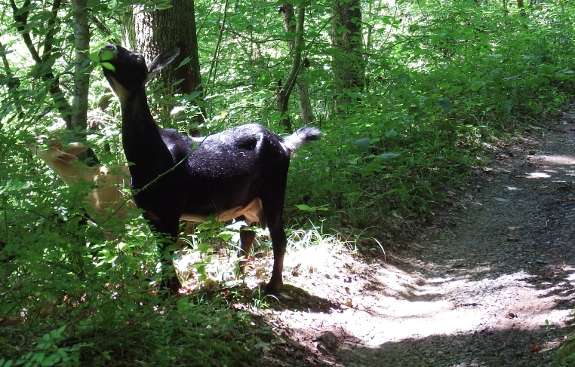
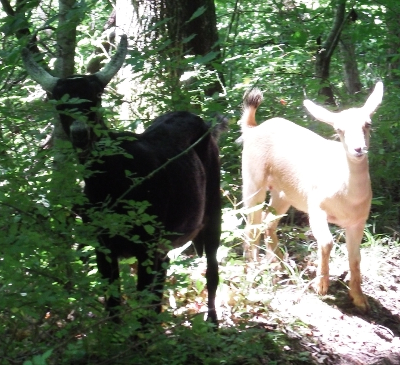 There's
a new darling doeling in town....
There's
a new darling doeling in town....
Back in the winter when
I named Aurora before she hatched, I asked Mark if he thought our
hypothetical doeling would be as sweet as her mother. "Sweeter," he
said promptly. "Impossible!" I replied.
But motherhood is tough
on everyone, and I'm forced to admit the transition to a new life stage
has taken a tiny bit of shine off Artemesia's halo. She's still the
world's greatest milk goat. She lets me milk her without locking her
head in the stanchion, goes wherever I ask without a leash, and
generally acts like the perfect herd animal.
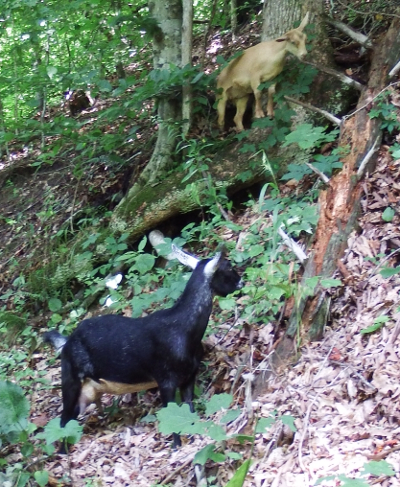 On
the other hand, making 6 cups of milk per day takes a lot of calories.
So Artemesia doesn't have as much time to caper as she used to.
Instead, she generally needs to hunker down and eat.
On
the other hand, making 6 cups of milk per day takes a lot of calories.
So Artemesia doesn't have as much time to caper as she used to.
Instead, she generally needs to hunker down and eat.
Enter doeling 2.0....
At three months old,
Aurora is just a little younger than Artemesia was when we brought her
home. And the sweetness of a teenibopper goat is very much in evidence.
Sunday, our darling doeling snuggled up to me as I read in the woods
and let me stroke her soft fur for quite a long time. And I realized
--- even though this sounds like heresy --- that Mark might be right.
Aurora might be even sweeter than her mother.
Lucy woke us up yesterday
morning barking like crazy.
She was chasing a deer out of
the garden and right through the front gate.
We needed a better
gate there anyway.
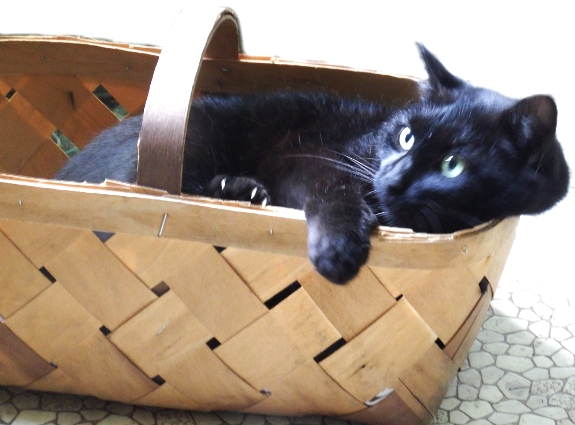
Question: Am I the only
one who turns into a bit of a basket case at the height of the summer
gardening and preserving season?
Answer: No,
Huckleberry's quite willing to join in the fun!
Punkin is now with his new
herd where he'll be the new stud goat.
It was a little sad to see
him go, but in the end we're glad he found such a good home and a new
purpose in life.
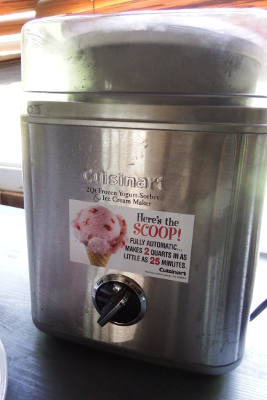 This summer has been
averaging 1 to 3 degrees hotter than previous
summers on our farm. That doesn't sound like much...until you realize
that we spend a lot of time working outside and I'm still stubbornly
avoiding air conditioning. (Mark has AC in his man cave.)
This summer has been
averaging 1 to 3 degrees hotter than previous
summers on our farm. That doesn't sound like much...until you realize
that we spend a lot of time working outside and I'm still stubbornly
avoiding air conditioning. (Mark has AC in his man cave.)
Long term, we're
pondering all kinds of passive-cooling systems. Short term, the
solution was obvious --- an
ice-cream maker!
This little machine
makes a great product...as long as you put in a
little TLC during the freezing process. Unfortunately, the procedure
isn't set-it-and-forget-it. Instead, it's
necessary to run a firm spatula around the inside every three to four
minutes during the course of the freeze cycle.
Without that step, you
end up with ice cream stuck so hard to the
nonstick surface that you can't pry it loose and end up having to
slowly but surely scoop it into your mouth as it thaws. Oh, the
hardship! No, Mark, that's not what I'm doing while you're cooling off
in your man cave. Really....
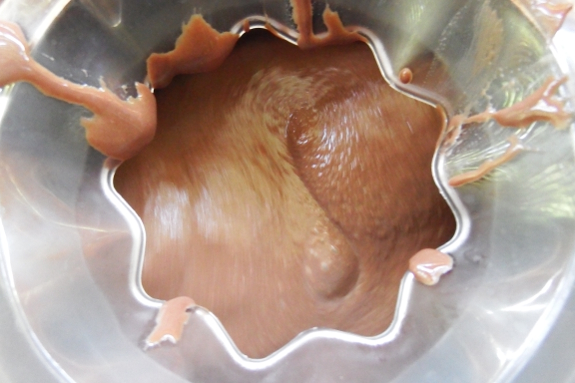
Ahem, anyway. In case
you're interested in following suit, I'm still
using a slightly modified version of this
recipe. Mark got
sick of mint
and I realized I could downgrade the chocolate chips a bit (although
not much or the consistency goes off). The final recipe for use in a
two-quart ice-cream maker includes:
- 6 cups rich goat milk (divided)
- 1 cup plus 2 tablespoons of cocoa
- 1 cup plus 2 tablespoons of sugar
- 1/2 teaspoon salt
- 1 cup of dark chocolate chips
- 6 tablespoons of cornstarch
- 1 teaspoon of vanilla extract
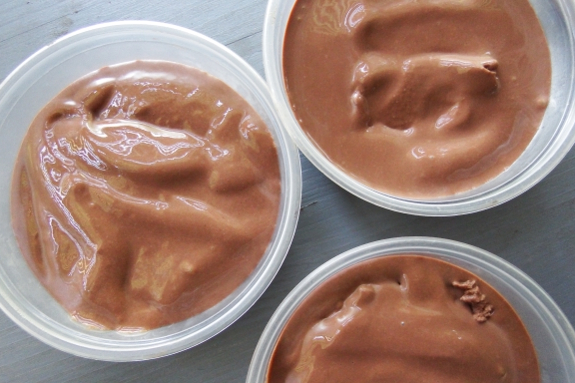
See the previously
linked post for cooking instructions and be sure to
cool overnight before tossing in the ice-cream maker. The end result is
soft-serve consisetency, so Mark and I like to ladle the contents into
eight individual-serving containers and put them back in the freezer
for 12 hours before eating. Enjoy!
Our new metal gate was just
as easy to install as the first
one.
The hinges let it swing both
ways and the powder coating should last for a long time.
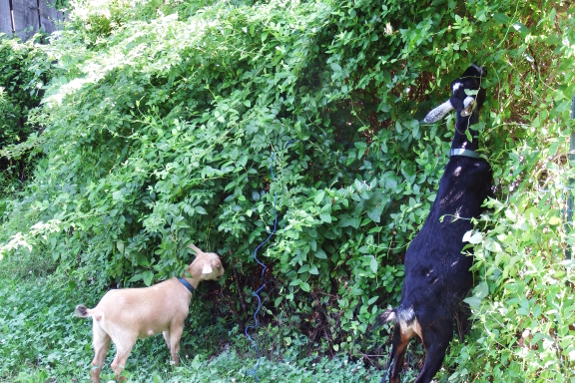
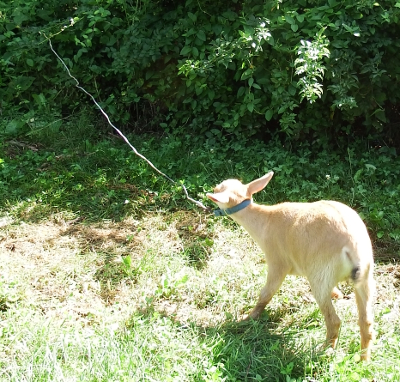 Now that Punkin has
moved on to his new home, I'm finally able to get back to tethering
our herd in the morning while I garden. Artemesia was thrilled at the
opportunity, but our little doeling wasn't so sure about the idea of
collars and leashes.
Now that Punkin has
moved on to his new home, I'm finally able to get back to tethering
our herd in the morning while I garden. Artemesia was thrilled at the
opportunity, but our little doeling wasn't so sure about the idea of
collars and leashes.
She had a small fit,
pouted for a while, then decided mimicking her mother was probably a
better way to utilize her time. I figure by the end of the week, Aurora
will be just as good at being tethered as Artemesia is.
Soon we'll have a lot of
extra cucumbers.
We don't like pickles so they
mainly get used as a side salad.
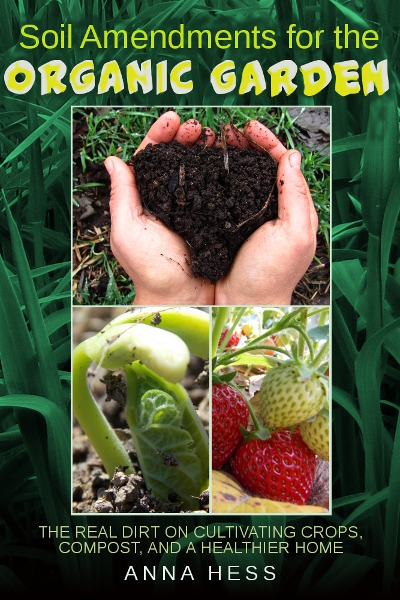 I'm excited to announce that
the final book in my Ultimate Guide to Soil series is now available for
sale!
I'm excited to announce that
the final book in my Ultimate Guide to Soil series is now available for
sale!
This one is long and
in-depth but very heavy on the pictures so hopefully still easy to
read. In addition to rundowns on more conventional garden amendments,
I've summed up our experiences with bokashi, black soldier flies,
humanure, biochar, and much more.
Here are the buy links
in case you want to give it a try:
- Amazon
- Barnes and Noble
- Apple
- Google Play
- Kobo
- Or if you'd rather buy all four books in the series in one package,
the paperback is currently marked
down to $12!
What early reviewers had
to say:
"I know more about composting and soil amendments now than I did before reading this - and I've been composting for 30 years, so I thought I knew it all!" --- Colin B. McGee
Thank you in advance for
any support, from buying a copy to telling a friend to leaving a
review. You are why I write.
Our Chicago Hardy Fig is
finally bouncing back from 2 Winters ago.
The highest point is just
over 6 feet.
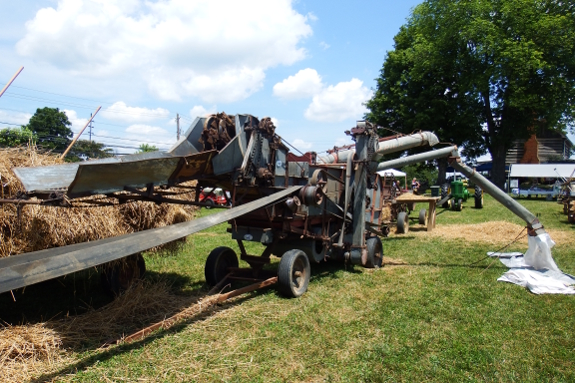
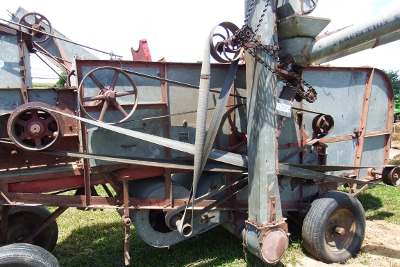 Kayla and I took in the
antique tractor show at Fairview in Abingdon Friday. It was
another perfect girl's day out, with an extremely well-behaved baby,
fascinating old implements (like this thresher --- look at all those
belts!), and quite a bit of historical education as a bonus.
Kayla and I took in the
antique tractor show at Fairview in Abingdon Friday. It was
another perfect girl's day out, with an extremely well-behaved baby,
fascinating old implements (like this thresher --- look at all those
belts!), and quite a bit of historical education as a bonus.
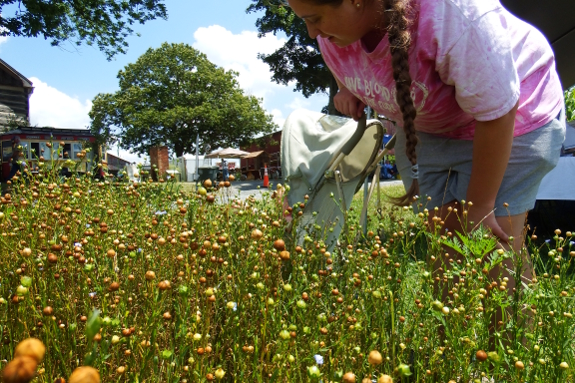
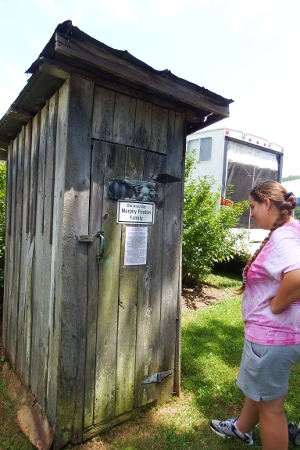 The interpretive signs were
top-notch, full of information I'd never considered. For example, did
you know that the crescent moon traditionally shown on an outhouse was
meant to designate the lady's room? Way back when the average American
couldn't read, stars were for guys and moons for girls...but men's
outhouses tended to get run down and didn't last. Thus the
crescent-moon-marked outhouses dominating the colonial landscape.
The interpretive signs were
top-notch, full of information I'd never considered. For example, did
you know that the crescent moon traditionally shown on an outhouse was
meant to designate the lady's room? Way back when the average American
couldn't read, stars were for guys and moons for girls...but men's
outhouses tended to get run down and didn't last. Thus the
crescent-moon-marked outhouses dominating the colonial landscape.
And speaking of outhouse
traditions, hollyhocks were usually planted around the outhouse as a
way to draw the attention without forcing a lady to request directions
to the necessary. Lamb's ears with their silvery ears did the same job
at night (while also providing backup toilet paper).
Oh, and the other
picture in this section is flax. I was proud of myself for guessing its
identity...and Kayla was proud of herself for capturing the plant
matter before it made it into baby D.'s gaping mouth.
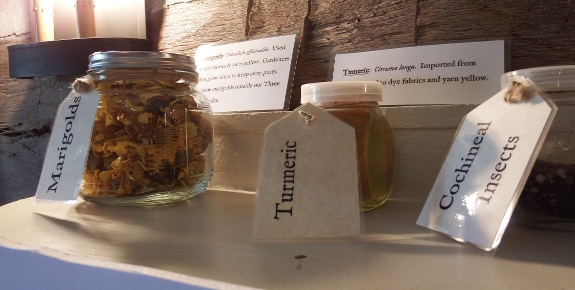
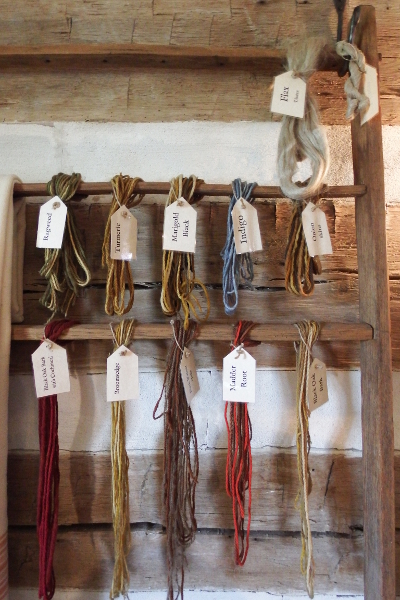 In
the air-conditioned comfort of the interpretive log house, we took in
several beautiful displays pertaining to history and crafts. On the
history front, I was intrigued to learn that I-81 (the big highway that
runs through our region) began as a buffalo trail but soon became a
major thoroughfare between Philadelphia and the Frontier.
In
the air-conditioned comfort of the interpretive log house, we took in
several beautiful displays pertaining to history and crafts. On the
history front, I was intrigued to learn that I-81 (the big highway that
runs through our region) began as a buffalo trail but soon became a
major thoroughfare between Philadelphia and the Frontier.
In the late eighteenth
and early nineteenth centuries, the so-called Great Philadelphia Road
was used for wagon trains of settlers (many from Europe) moving to new
land and also for people from our region driving their sheep, pigs, and
cattle to market in the City of Brotherly Love. Can you imagine
making that 500-mile trek at the tail end of a herd of swine?
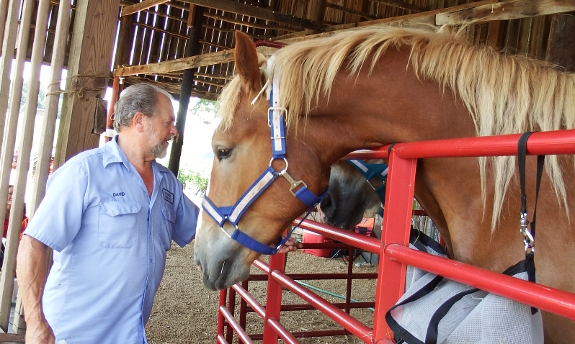
 The
upshot? Best girl's day out yet! Think we can top this in August, Kayla?
The
upshot? Best girl's day out yet! Think we can top this in August, Kayla?
Solarization
is still a major time saver for us.
Sometimes the plants end up
winning when the plastic is on its last leg.
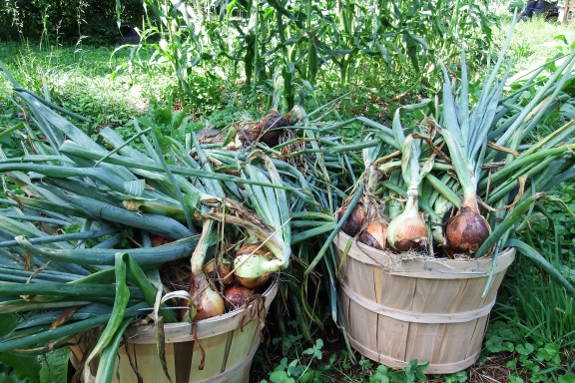
I usually wait to
harvest our onions until the leaves have dried down. But the summer
abruptly turned wet and I began noticing a few signs of rot. Time to
get our precious bulbs out of the ground before they go bad!
I harvested perhaps
three-quarters of the onions Tuesday, filling up three bushel baskets
and then transferring the contents over onto one of our curing
racks. Maybe I
actually planted too many this year?
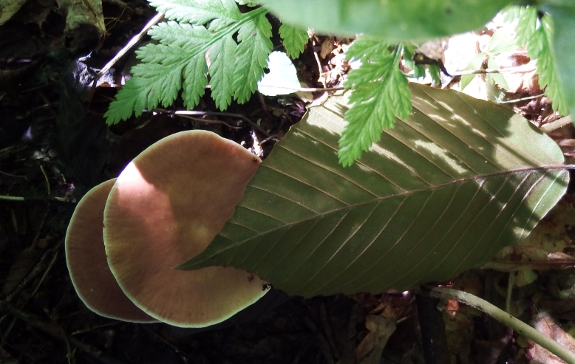
Despite the current
bone-dry conditions, mushrooms are popping up all over the woods.
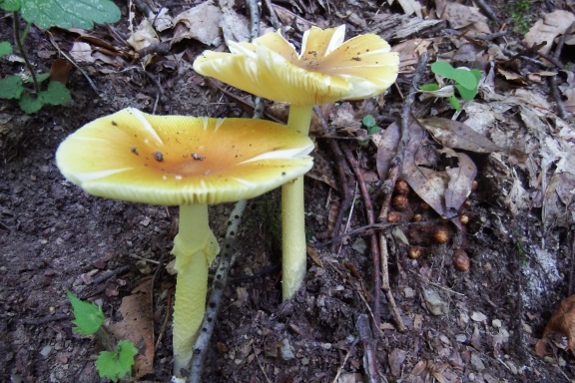
There's a certain zen
wonder in not being able to identify most of them but still enjoying
their beautiful shapes and colors.
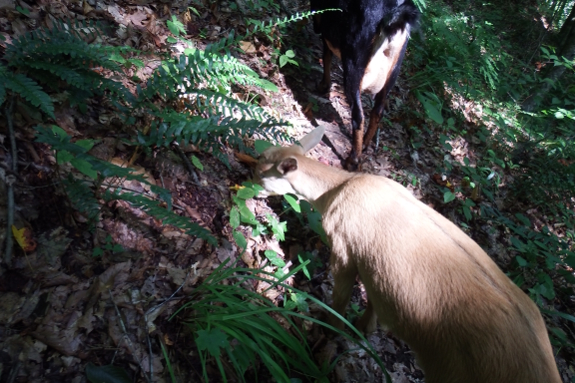
Meanwhile, the goats are
much more interested in the first golden tulip-tree leaves filtering to
the ground. To each her own!
Of course our new gate would not be complete without a Lucy access door.
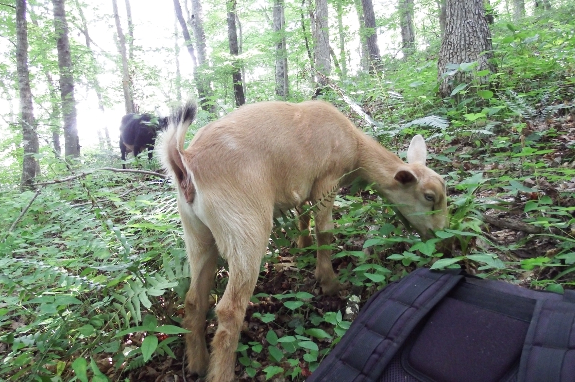
I was a bit dubious of our
vet's diagnosis that Aurora was merely suffering from internal
parasites. After all, would she be fine one day and then nearly
comatose the next in that case? But now I'm thinking he was right.
Because ever since being flushed out with a vast array of
pharmaceuticals, our doeling has been growing faster and plumper every
day.
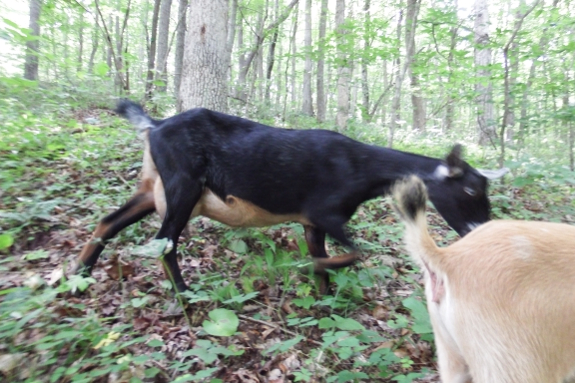
Her mama, on the other
hand, is starting to drop below the perfect 3.0 body-condition
score. That's perfectly normal with heavy milkers, but I'm still
going to try to plump her up with some extracurricular grazing in hopes
we can keep her fat enough to 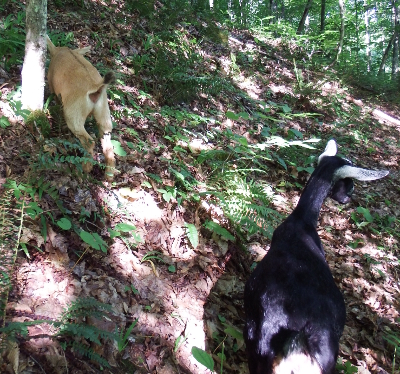 milk through the winter.
milk through the winter.
It's a long shot for a first freshener to milk through, but it sure
would be nice not to have to worry about the hassle of breeding and
kidding this fall and next spring. August and early September will be
the deciding time because I'd like to breed around Halloween if we're
going to have to dry
Artemesia off and give her time to recover before turning her back
into a milk jug once again.
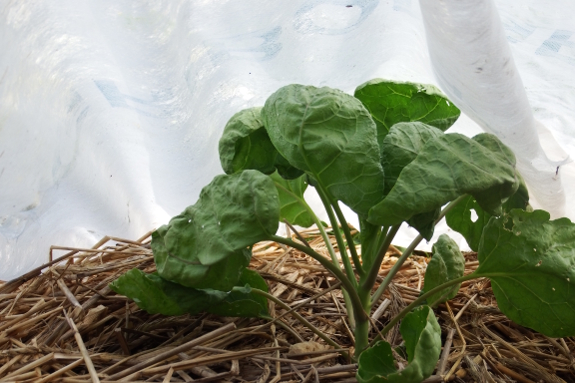
In about a month, we'll top the plants so they start producing baby cabbages for winter meals.
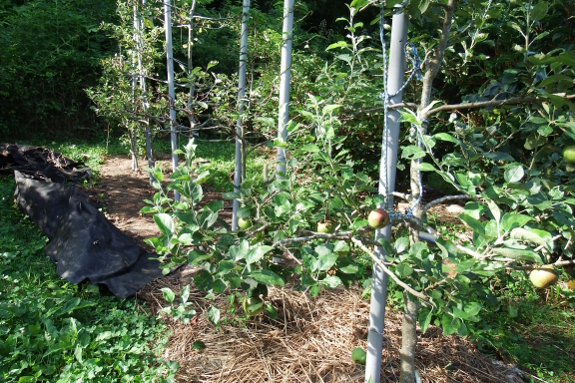
Last year, we installed landscape
fabric beneath most
of our oldest row of high-density apples. The idea was to cut weeding
work...but I'm afraid the plastic mulch also appears to be cutting
vitality.
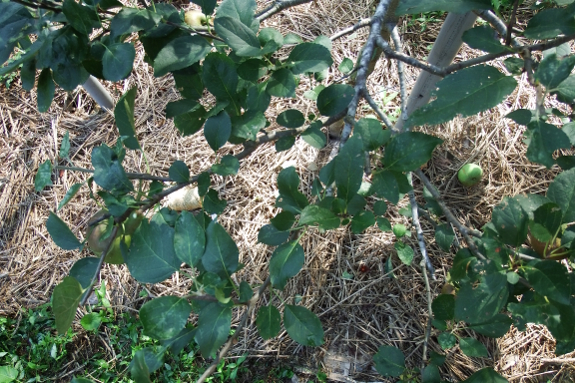
It's hard to be sure
whether the fabric is at fault because I have several different apple
varieties growing in this area and there's some fireblight in the mix.
But the apples that were mulched with straw are thriving while those
amid the landscape fabric have lost most of their leaves.
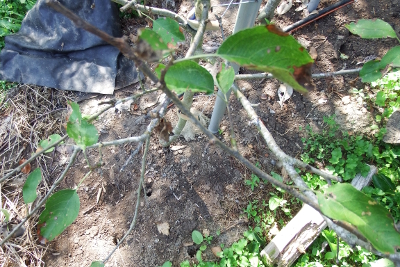 I suspect water is the
culprit --- or lack thereof. Summer rains tend to fall hard and fast in
our area, meaning that a lot of that liquid likely runs off the
landscape fabric despite the small holes meant to allow rain to soak
through. In contrast, straw grabs and holds the liquid, topping up the
trees' reserves slowly over the course of several days.
I suspect water is the
culprit --- or lack thereof. Summer rains tend to fall hard and fast in
our area, meaning that a lot of that liquid likely runs off the
landscape fabric despite the small holes meant to allow rain to soak
through. In contrast, straw grabs and holds the liquid, topping up the
trees' reserves slowly over the course of several days.
I've pulled back the
fabric so I can topdress with manure, and I'll probably end up
replacing it with a biodegradable weed barrier of cardboard coated with
straw. If we had an irrigation system that hit these trees, the plastic
might not be a bad idea. But, for now, I'm going to stick with what
works.
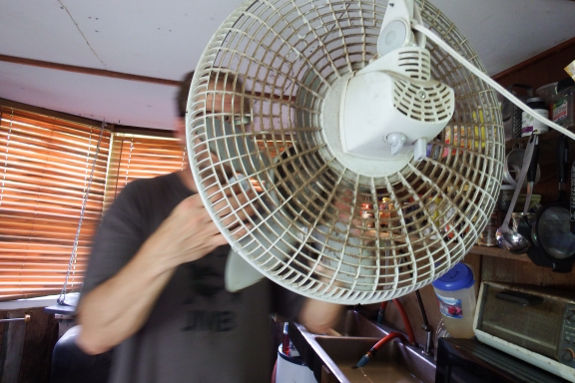
Simply snap off the fan guard and loosen the nut on the front to disassemble for easy cleaning.
Just remember --- on fans, righty loosy, lefty tighty.
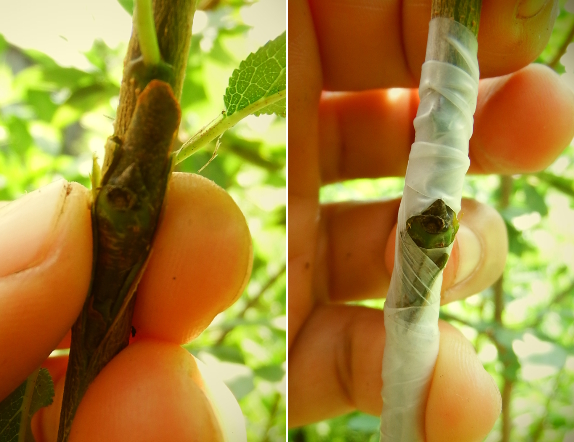
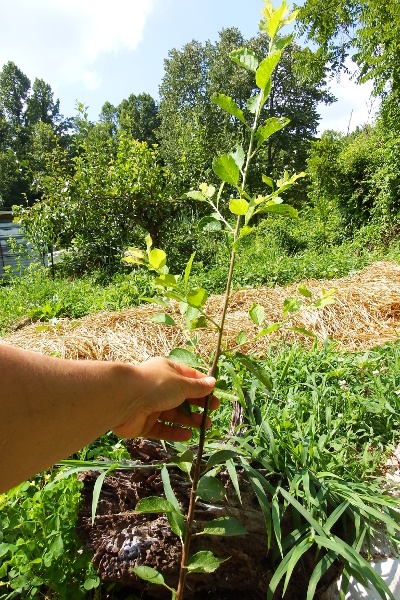 Stone
fruits (peaches, plums, etc.) can be dormant-season grafted
just like apples. For example, the baby tree to the right is an
Imperial Epineuse that I whip
grafted onto purchased rootstock in early April 2015. Halfway through its second
season, the young plant is thriving.
Stone
fruits (peaches, plums, etc.) can be dormant-season grafted
just like apples. For example, the baby tree to the right is an
Imperial Epineuse that I whip
grafted onto purchased rootstock in early April 2015. Halfway through its second
season, the young plant is thriving.
On the other hand, the
other four plums that I grafted at the same time perished. So I decided
to earmark my homegrown
plum rootstock for a
more appropriate type of stone-fruit grafting --- budding.
Less than two months
after setting out the stooled rootstocks, the plants had expanded into
a thicket of growth. So I whittled each one down to a single large
stem, cut T-shaped incisions in the developing bark, then peeled it
back enough to slide bud shields from a named variety into the hole.
Since I'm just beginning to feel my way through bud grafting, I
inserted two buds into each of the nine rootstocks. With even a 10%
success rate, I should end up with two new plum trees --- fingers
crossed!
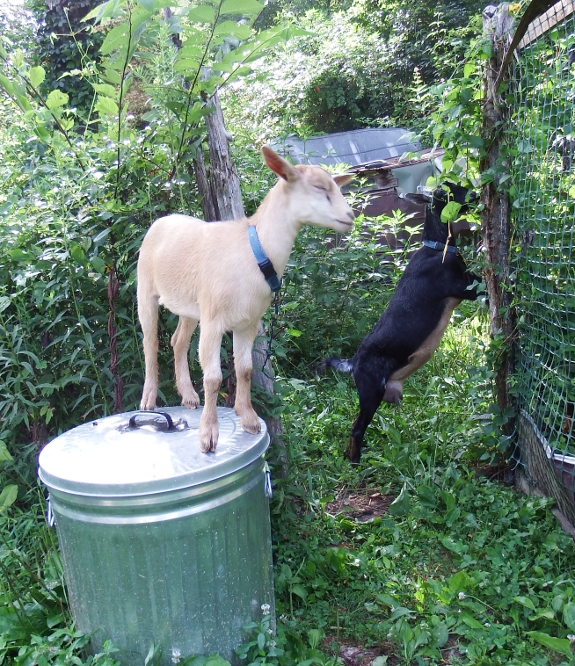
Someone's proud of herself
for learning to jump on top of a slippery trashcan lid at the limit of
her tether.
Do you think she's ready to join the circus?
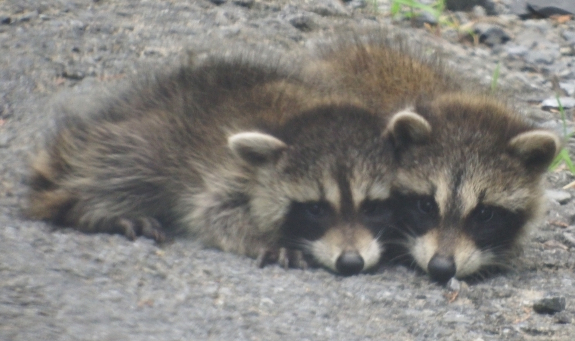
July has been an
extraordinary month for local wildlife. Within walking distance of our
core homestead, we've seen:
- A juvenile black bear near our neighbor's mailbox
- A black coyote on top of a round haybale that jumped down to join its more normally colored partner
- Masses of turkeys, including a mother with twelve offspring that seemed to whittle down to about seven over the course of three weeks...unless that was a different family
- These two baby raccoons by the same neighbor's mailbox
- And --- the kicker --- massive bear tracks near where we park our
vehicles that were longer than my own barefoot tracks
What surprises will
August bring?
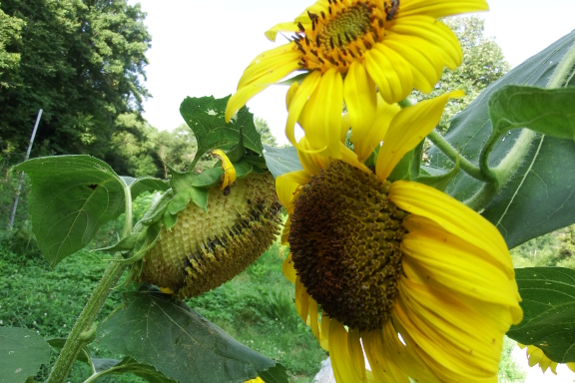
Soon we'll harvest mature heads for winter goat fodder.
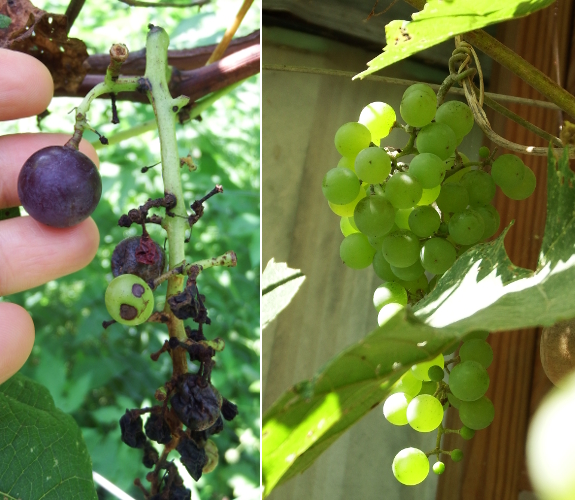
When I first started
researching seedless grapes, the consensus appeared to be that they
were very difficult to grow without spraying. "Whatever," I thought
naively. "My grapes will do fine."
The Mars Seedless on the
left shows what generally happens with that kind of attitude. Fungi
began attacking the young grapes over a month ago, and at first I
plucked off the affected fruits whenever I noticed damage to prevent
the disease from spreading. Eventually, though, I threw up my hands and
let nature take its course. And, in exchange, nature provided one ripe
grape. The lone fruit was tasty...but not a very good harvest from two
vines that have spent nearly five years in the ground.
In stark contrast,
Reliance is continuing to live up to its name. I started the vine on
the right from a cutting less than three years ago. It's already
fruiting, and after picking off only one or two blighted grapes, the
clusters are now pristine. One was already ripe enough to eat and it
definitely hit the spot!
Guess which variety is
going to replace the troublesome Mars Seedless this winter?
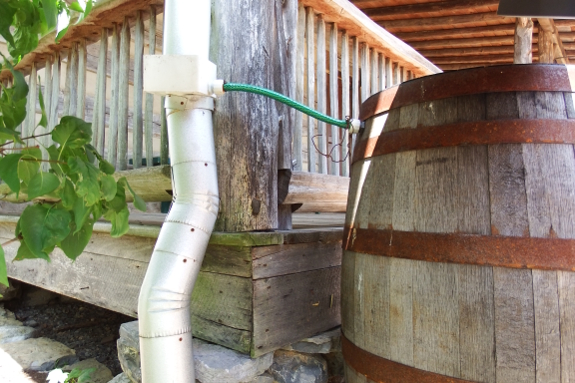
Assuming the diverter is at the same elevation as the top of the rain barrel, it should do away with the need for an overflow pipe.
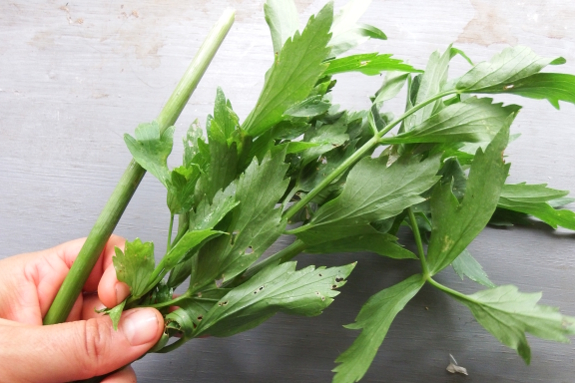
I started a variety of
perennial herbs from seed last year and my only failure was lovage.
Luckily Mom had better luck with the seedling I passed on when I ran
out of room in my own garden.
She brought me a sprig
of the mature herb to try out this past week, and I was surprised to
find how very celery-like the flavor was. I'd been assuming lovage
would taste more like parsley. Instead, the milder flavor meant I
should have added more to my tuna-patty test case.
Overally, a tasty treat.
I'll definitely have to get more serious about adding this perennial
herb to our garden!
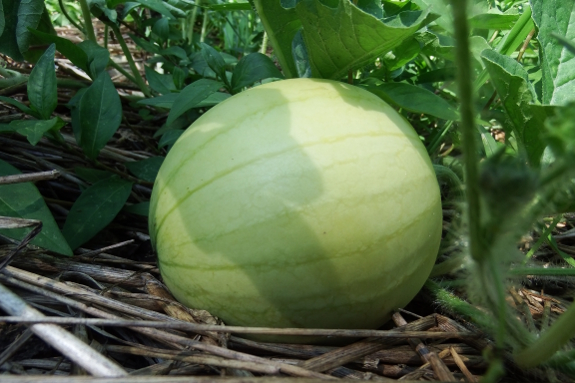
We had our first Faerie
Hybrid watermelon today.
The size was just right for
two people.
It was about half as sweet as
you usually expect for a watermelon.
Want more in-depth information? Browse through our books.
Or explore more posts by date or by subject.
About us: Anna Hess and Mark Hamilton spent over a decade living self-sufficiently in the mountains of Virginia before moving north to start over from scratch in the foothills of Ohio. They've experimented with permaculture, no-till gardening, trailersteading, home-based microbusinesses and much more, writing about their adventures in both blogs and books.
